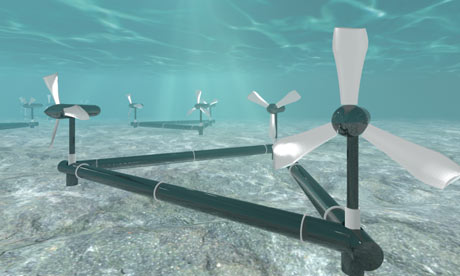Tidal power gets a boost from propeller and wind turbine techonology
Posted by Big Gav in ocean energy, severn estuary, tidal power, uk
The Guardian has a report on some new tidal power technology from a company in Wales inspired by ship propellers and wind turbines - Tidal power gets a boost from propeller and wind turbine techonology.
Propellers on ships have been tried and tested for centuries in the rough and unforgiving environment of the sea: now this long-proven technology will be used in reverse to harness clean energy from the UK's powerful tides.
The tides that surge around the UK's coasts could provide up to a quarter of the nation's electricity, without any carbon emissions. But life in the stormy seas is harsh and existing equipment – long-bladed underwater wind turbines – is prone to failure.A Welsh renewable energy company has teamed up with ship propulsion experts to design a new marine turbine which they believe is far more robust.
Cardiff-based Tidal Energy Limited will test a 1MW tidal turbine off the Pembrokeshire coast at Ramsey Sound, big enough to supply around 1,000 homes. Their DeltaStream device, invented by marine engineer Richard Ayre while he was installing buoys in the marine nature reserve near Pembrokeshire, will be the first tidal device in Wales and become fully operational in 2010.
To ensure the propeller and electricity generation systems were as tough as possible, the tidal turbine's designers worked with Converteam, a company renowned for designing propulsion systems for ships. "They've put them on the bottom of the Queen Mary ... and done work for highly efficient destroyers, which is exactly the same technology that we're looking at here," said Chris Williams, development director of DeltaStream.
DeltaStream's propellers work in reverse to a ship's propulsion system – the water turns the blades to generate electricity – but the underlying connections between blades and power systems are identical to those on the ship.
Tidal streams are seen as a plentiful and predictable supply of clean energy, as the UK tries to reduce its greenhouse gas emissions. Conservative estimates suggest there is at least 5GW of power, but there could be as much as 15GW – 25% of current national demand.
A single DeltaStream unit has three propeller-driven generators that sit on a triangular frame. It weighs 250 tonnes, but is relatively light compared with other tidal systems which can be several times heavier. The unit is simple to install and can be used in closely packed units at depths of at least 20m. Unlike other tidal turbine systems, which must be anchored to the sea floor using piles bored into the seabed, DeltaStream's triangular structure simply sits on the sea floor.
Meanwhile advocates of a tidal lagoon system rather than a tidal barrage in the Severn estuary continue to make their case - Severn barrage: Row breaks out over UK's biggest renewables project.
Government consultants have been accused of miscalculating the costs of a project to generate vast amounts of green electricity in the Severn estuary, promoting a 10 mile-long tidal barrier strongly backed by ministers in preference to a scheme that engineers and environmentalists say is far less damaging.
The US engineering firm Parsons Brinckerhoff has been hired by the Department of Energy and Climate Change (Decc) to assess technologies that could meet, from the Severn estuary, up to 7% of the electricity consumption of England and Wales. Its feasibility study for the estuary, which has the second highest tidal range in the world, has been sent to ministers, who will soon announce a shortlist of potential schemes based on the assessment.
Finding a way to harness the power of the Severn's tides is important as it would represent a big step towards Britain's target of generating 35% of all electricity from renewable sources by 2020.
Sources in Decc say the firm favourite is the 10-mile barrier, which would span the entire estuary and is costed at about £14bn. Parsons Brinckerhoff (PB) said the barrier could generate between 5GW and 8.6GW of renewable electricity at a cost of about 3p/kWh, but that it would impede shipping and lead to permanent flooding over more than 100 miles of shoreline.
Ministers have already called the scheme "visionary" and a "trailblazer for clean, green energy".
But correspondence seen by the Guardian shows that a row erupted between PB and a company promoting a scheme that environmental groups and other engineers claim would be far less damaging, as well as cheaper and more efficient.
Tidal Electric wants to generate electricity by using tidal lagoons built on the estuary floor from rock. Up to 13 lagoons would be dotted around the Severn estuary, not across it. These would trap water at high tide and release it later through electricity-generating turbines.
Studies carried out by the engineers AS Atkins, for Tidal Electric, have suggested that the lagoons could generate twice as much power, per square mile impounded, than the barrage, and therefore generate about 25-40% more energy without damaging the shoreline.
However, the plan sent by PB to ministers says the tidal lagoon option would be eight times more expensive than the barrage scheme and would not generate as much power.
But Peter Ullman, chief executive of Tidal Electric, said: "PB has made huge miscalculations. They have submitted [to ministers] cost-numbers on power from tidal lagoons that are roughly 800% higher than all the previous studies of tidal lagoon power conducted by UK engineering giant WS Atkins and corroborated by AEA Technology, Ofgem and Rothschild Bank. They have arrived at their extraordinarily high numbers by ignoring the technology developer's design parameters and introducing their own design."
One key issue is that Tidal Electric plans to site the lagoons in shallow water, while PB assumes they would be built – at a higher cost – in deeper water.






